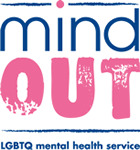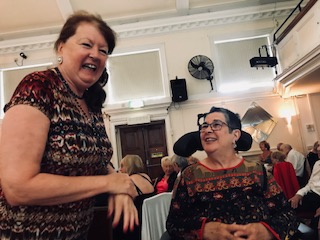Elaine recently shared what it has been like for her to be a lesbian, disabled, and suffer from mental health difficulties.
‘I’ve suffered from poor mental health most of my life and it’s only recently that I have had support.
For years I lived a lie for fear of rejection from family and society. After doing what I felt was expected – getting married and having children I came “out” as a lesbian as I could no longer live a lie. At the time family and some friends thought it was because I was depressed and unhappy.’
Often people attribute the effects of minority stress, like anxiety and depression, as ’causes’ of being LGBTQ+ identified, when they are, in fact, the effects of not being able to be true to yourself. Elaine has, with the help of MindOut’s services, found ways to connect with community and learn ways to cope with her mental health struggles.
‘I couldn’t be open as me to many people [after I came out]. At work I faced bullying due to my sexuality. My physical and mental health took the toll. After becoming disabled I came across carers who were homophobic. I was even told that my physical health was due to my sexuality! I felt I was going mad.
Recently after my mental health spiralled out of control with urges of suicide, I have been fortunate to have support from MindOut and been on courses to help me learn to deal with depression and anxiety. I find meditation, being creative, going out every day trying to be involved in the community all help me. Plus having a daily self-care routine eating healthily and exercise all help me deal with stresses.
Being in my sixties there are still some people I am not “out “to for fear of recrimination. I feel I can’t be open to my family about my mental health so can feel quite isolated. At least now I’ve the support and skills to live.’
Elaine’s story demonstrates how important it is for people in the LGBTQ+ community to support each other. By connecting with others, a person can feel less alone and know that they are not the only one facing tough experiences.

